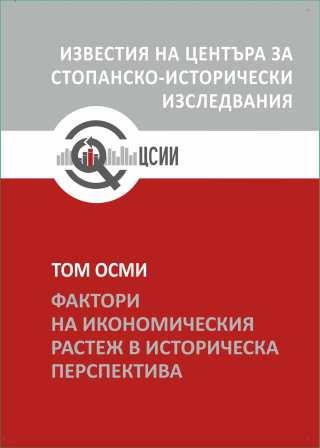ОПИТИ ЗА СТИМУЛИРАНЕ НА ЧАСТНАТА СТОПАНСКА ИНИЦИАТИВА В БЪЛГАРИЯ ПРЕЗ 80-ТЕ ГОДИНИ НА ХХ ВЕК
ATTEMPTS TO STIMULATE PRIVATE BUSINESS INITIATIVE IN BULGARIA IN THE 1980S
Author(s): Kostadin PaevSubject(s): History, Economy, National Economy, Business Economy / Management, Marxist economics, Economic history, History of ideas, Social history, Recent History (1900 till today), Special Historiographies:, Human Resources in Economy, Socio-Economic Research
Published by: Център за стопанско-исторически изследвания
Keywords: private business activity in 1980s; legal regulations for stimulation the private business initiative; ideological restrictions; mixed state-private forms of business; wage labor
Summary/Abstract: The apparent lagging behind of the socialist economy in the late 1970s forced the government to take steps towards expanding the possibilities of exercising private initiative in the various areas of the economy in the 1980s. All reformist attempts are confronted with the limited possibilities of the system. Experiments with mixed state-private forms of economic activity also do not achieve the expected result. The range of activities and persons admitted to private business is gradually expanding. This is mainly done through the issuance of new regulations. Key in this respect remains the issue of wage labor, which for ideological reasons is not allowed outside the family community. The study examines the legal regulation of private practice in trade, services, and retail production, excluding agriculture and the liberal professions. In the early 1980s, there was an intensification of the state's policy of stimulating private economic activity in the three spheres, given the lack of sufficient satisfaction of citizens with consumer goods and services. The Communist Party, which defines the general directions of development of the Bulgarian economy, falls into a vicious circle between the needs of society, the desire to satisfy them and the limited capabilities of the political regime. In the 1980s, two periods emerged in the policy of the State in this respect: from 1980 to 1986 and from 1987 to 1989. In the first period, the following main trends emerge: expanding the circle of persons allowed to carry out private commercial activity; the range of activities carried out is expanded too; as the main participants in private business and small production, in addition to parents and children, it is allowed to hire close relatives up to the second degree. At the end of this period in 1986, about 20 % of the country's population received additional income from private activities, but almost half of this income is from renting out premises, while persons engaged in trade, services, and retail manufacturing made up only 1% of the population. In the second period, a new step is made by regulating the performance of private work by citizens in five main areas: transport, pedagogical, administrative-legal and design services, and development of software products and software services. Again, however, the opportunities for hiring individuals are limited within the family circle. It was only with the issuance of Decree 56 on business activity at the beginning of 1989 that conditions for transition to a capitalist market economy were created.
Journal: Известия на Центъра за стопанско-исторически изследвания
- Issue Year: VIII/2023
- Issue No: 1
- Page Range: 186-196
- Page Count: 11
- Language: Bulgarian

